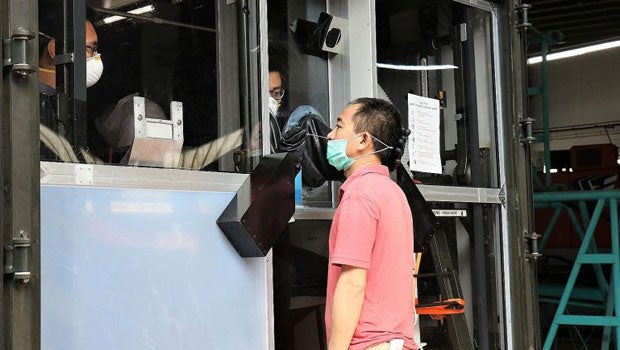
Workers can be swabbed while they are outside the ambulance.PHOTO: MINDEF
A new mobile swab station has been rolled out, aimed at making it faster and safer for healthcare workers doing Covid-19 swab tests at foreign worker dormitories.
The mobile swab station (MSS) integrates a booth system developed by the Singapore General Hospital, called SG Safe, into a Singapore Armed Forces cross country ambulance.
Workers can be swabbed while they are outside the ambulance. The uncontaminated environment in the ambulance means the swabber does not need to wear full protective gear, such as a hairnet, gown and goggles.
To perform the test, the swabber puts his hands into a pair of gloves affixed to a glass panel to take samples from a worker's nose.
The joint project by the Singapore Army, Defence Science and Technology Agency (DSTA), and ST Engineering will help in the testing of all 323,000 foreign workers in dorms. So far, more than 32,000 of them - or about 10 per cent - have been tested.
The MSS was deployed on Monday (May 11) to do swabbing operations at places outside of purpose-built dorms.
More might be deployed, depending on the needs of the inter-agency task force handling the Covid-19 outbreak among foreign workers.
Military Expert 7 Low Koon Huat, 53, who co-leads a task force that provides technical support to other task forces, told reporters in a virtual interview on Wednesday (May 13) that previously, the swabbing booths had to be moved from site to site, and the MSS makes this process more efficient through reducing the logistics involved.
Compared to having to carry and unload the SG Safe booth system to set it up on-site from a vehicle, which takes about 30 minutes, getting the MSS ready takes half that time.
Captain (Dr) Ivan Low from the SAF Medical Corps said his team feels much safer operating from within a clean environment.
"This is made possible by the ventilation filtration system, which essentially transforms the cabin into a giant N95 mask. Furthermore, the cabin is pressurised to reduce the risk of droplets, aerosols entering the compartment.
"Therefore the MSS comes with a significant reduction of transmission risks to healthcare workers, giving us the confidence to carry out our professional tasks effectively," he added.
The fact that the swabber remains seated throughout the operation, having to wear only N95 masks and gloves inside the air-conditioned cabin, means it is a "very comfortable environment to operate out of for an extended period of time," said Capt (Dr) Low, 26.
Each MSS can be set up by three people, namely the transport operator, the person conducting the swab, and another to collect the swab sample after it is completed. Other than the swabber, the other two people do not need to be medically trained.
Two more MSS prototypes - involving a multi-utility vehicle with one swab station and a 20-foot container with three - are expected to be ready by the end of June.

The Mobile Swab Station (MSS) was developed to ensure swift deployment of swab teams to various locations, while ensuring that their safety is not compromised. PHOTO: MINDEF

A migrant worker scanning his Work Permit on the Mobile Express Scanner (MExS) at the registration counter. PHOTO: MINDEF
Army engineers from the Maintenance and Engineering Support headquarters have also developed an application which reduces the registration time taken for workers being swabbed - from four minutes to less than one.
The workers do not have to writedown their particulars using pen and paper, as the mobile express scanner, which is installed on a smartphone, extracts data from the workers' work passes. This not only reduces the swab administrator's contact time with the workers, but also helps to ensure accuracy in the tagging of swab samples.
Since last Saturday (May 9), 10 sets of these scanners have been used at 38 sites islandwide, covering around 2,000 people.
Mr Sebastian Lim from the DSTA, who co-leads the task force with ME7 Low, said the idea for a filtration system for the MSS came about when they noticed that patients sometimes cough out infectious droplets during the swab tests.
"So what we did was, besides having the shield as a physical barrier, we integrated the ventilation filtration system... to filter away these particles before the air is pushed into the cabin. So we have an added layer of protection for the crew operating in the cabin," said the head of capability development for wheeled vehicles, 45.
Compared to a typical modification project that can take more than three months, the MSS was ready to be used within three weeks from conceptualisation.
Mr Lim said there were still improvements to be made to the MSS. "For example, after we have deployed on the ground, as the army also started rolling out their mobile scanner app... our next step is to bring the registration counter into the cabin as well, so that fewer people need to be outside."













 Get it on Google Play
Get it on Google Play